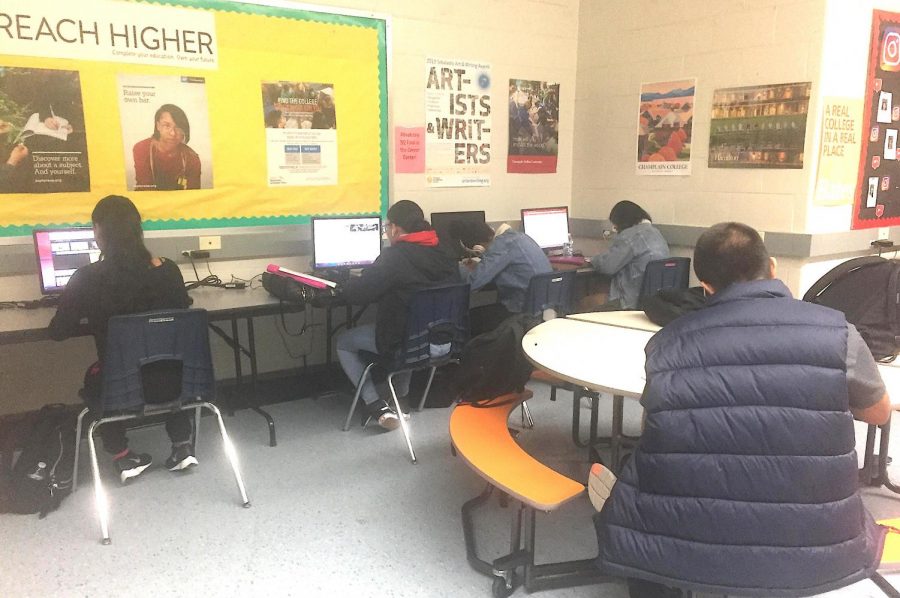College admissions scandal: ‘It’s exploitation and fraud’
Yale, USC among colleges involved in alleged bribes
Students work on researching colleges, scholarships and the application process at the Career Center.
March 26, 2019
With college fast approaching for seniors and on the horizon for underclassmen, the news of a college admissions scandal came as a shock when headlines broke earlier this month.
The scandal was uncovered by federal officials, and features Hollywood actresses Lori Loughlin and Felicity Huffman, among many other wealthy individuals who allegedly paid large bribes to college admissions consultant William “Rick” Singer.
Federal prosecutors have named schools from coast to coast — including Yale and USC — involved in the alleged scam admissions. Yale announced this week that it had rescinded the admission of a student because of the charges, according to the Yale Daily News.
Singer’s methods for guaranteeing admission to these top schools included bribing coaches and having others take standardized tests for his clients to ensure high test scores and entrance to prestigious universities. He has since been charged with money laundering.
Though the principal accused is Singer, his clients were aware of the criminal nature of their scheme and have also been charged with fraud, according to federal officials. Loughlin and Huffman have since been released on bail. Details of the charges can be found here.
Many students and teachers deem the lack of merit in the adolescents involved to be the most outrageous aspect. “What about the athletes that work out everyday after school,” asked college-bound senior Ashley Schlemmer. “What about students like me who work tirelessly for our grades? Shouldn’t those kids deserve a spot before the ones who paid their ways to get in?”
Singer’s clients never earned their esteemed positions; teenagers involved, such as Loughlin’s daughter, Olivia Jade, received coveted positions on sports teams they had never participated in and used scores from tests that were taken by officials of Singer’s organization, prosecutors allege.
“I feel like Singer and his clients are ripping away opportunities from the millions of kids across the nation who actually try and are wanting to get into school,” said senior Kayla Tolliver-Van Wright, referencing Jade’s claims that her first priority is “Youtube over school” in her USC dorm tour video.
Kathy Boucher, coach of the Girls’ Golf team and social studies teacher, argues that the accused coaches are the ones taking away opportunities. “The fact that these coaches had to accept the bribes despite the success of their respected sports teams is unacceptable,” she explained.
“All of the girls on my team work hard in athletics and academics,” Boucher continued. “It is kids like those who make the team. I’m appalled that coaches would recruit those that never even played before merely for their individual financial gain.”
Many, however, aren’t that surprised by the scandal. “The system has always been that way: Rich kids, legacy kids, and those without merit have been favored by Ivy Leagues and other top universities for years,” said family and consumer science teacher Kimberly D’Auria.
In fact, the New York Times reported that of 38 of the top schools in the U.S., more students came from the top 1 percent than the bottom 60 percent. Every single one of the top 65 U.S. universities had a median parent income of $100,000. “These injustices have been going on for years,” said sophomore Morgan Albano. “It just goes to show the classical unfairness of the college system.”
Still, some members of the DHS community emphasis the shocking criminal nature of this scandal. “These celebrities are taking advantage of an already broken system,” explained history teacher Anthony Steady. “It goes beyond the inclination towards legacy and wealthy students; it’s exploitation and fraud.”
Steady also empathized with DHS seniors who are toiling away for their chance at furthering their education at the next level.
One such senior is Angelina Campos, who plans on attending university in the fall. “My friends and I work two jobs. It’s really hard for us to even dream of being able to fully afford the colleges we applied to. We deserve our acceptance, unlike those who bought their ways in,” she explained.
Sophomore Lucy Chen is part of the Upward Bound program, which provides opportunities for first-generation college or low-income students to succeed in high school and prepare for college.
Everyday, she and others at DHS work tirelessly to pursue their dreams. “It pains me to see that there are still people that take advantage of the worth of money in this world,” she explains.
However, this doesn’t deter her from continuing to succeed, a value instilled by Upward Bound assistant director Jessica Coronel. “Students should not use circumstances like this as an excuse to not apply themselves into universities. They should continue to work hard; cheating like this will only result in trouble,” Coronel says.
It is evident that these headlines have caused many to reevaluate their beliefs about wealth and success, and has led to greater publicity regarding the ever-present economic inequality plaguing the nation.
Junior Andrew Lewis said he hopes something good comes from the mess. “I can only hope that people will start to realize the divergence between those who work hard and those who pay to get ahead. Maybe the criminal charges will begin to place value again on hard and honest work,” he said.
Guidance Counselor Karen Chance said that this “coming to light” will help give colleges a push towards focusing on the student journey.
“There should be no room for wealth, power, or bribing being a factor in admission,” she explained. “Hopefully, colleges will begin to focus on what a student creates instead of the opportunities awarded to them because of their parents.”
When asked what students should take away from this scandal, she ultimately concluded, “In the events of the charges pressed, I hope this proves to DHS that hard work is still worth it. Continue working diligently, and it will pay off!”






















